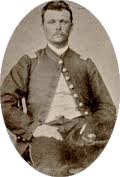A Mephitis Mephitica in Vancouver

From the desk of Steve Willis, Central Library Services Program Manager of the Washington State Library:
Although I suspect what we are reading here is a private and cryptic joke, it still makes for entertaining copy. The following was found in the March 28, 1871 Port Townsend Weekly Message:
A POVERTY STRICKEN INTELLECT.
“–We commend the following extract from Donn Piatt to the prayerful and serious consideration of our old and very particular friend Major Adams, of the Vancouver Register. Donn says: ‘To get hold of a name and distort it– to shake and worry it as a pup would an old boot, is an indication of a mean and poverty stricken intellect.'”
“Do you remember, minor Adams– for you are no Major– the evening in Olympia when, in the presence of a respectable family circle, you asked the host for his private key, to the confusion of the ladies and disgust of the gentlemen? You disreputable old bird! Don’t you bandy words with us, else you will find the ‘Julius Caesar’ will relate an episode of your boyish life which will account for your vulgar obscenity and profane scurrility. Do you know the meaning of Mephitis Mephitica? It is your prototype. Look in the natural history of your native State and see from which you sprung. Like it, no one can approach you, even in friendship, without the whole community being overpowered by the disgusting effluvia and suffocating stench which you emit at all times and without any provocation. When you ring any more changes like an old poll parrot on ‘Julius Caesar’ you only prove your poverty stricken intellect.”
To save you the trouble of looking it up, a Mephitis Mephitica is better known as the skunk.
Major Adams was Enoch George Adams born in 1829 to “Reformation” John and Sarah Adams in Bow, N.H. He graduated from Yale and developed an interest in poetry, writing work for publication for the rest of his life.
During the Civil War Adams fought in the Union Army and was wounded at Williamsburg in 1862. After recovering he returned to the field and was sent in command of Rebel POWs at Fort Rice, Dakota Territory in an unusual arrangement. If the Confederates served in the Union Army in the hostilities against the local Native Americans, the prisoners could earn their freedom.
During this time period Adams also published a newspaper, The Frontier Scout, which included, of course, his poetry. He was discharged with the rank of Major.
Major Adams made his way West and by the early 1870s was editing the Vancouver Register. He had  also been appointed to the Land Office. During the time the above article was published, a petition had been circulating to remove Adams from the government position on grounds of incompetency. Adams’ response in print was to ask why anyone would “wish to deprive an old bullet-pierced soldier of the small pittance doled out to him after long years of hardship and danger …”
also been appointed to the Land Office. During the time the above article was published, a petition had been circulating to remove Adams from the government position on grounds of incompetency. Adams’ response in print was to ask why anyone would “wish to deprive an old bullet-pierced soldier of the small pittance doled out to him after long years of hardship and danger …”
Adams later moved to St. Helens, Oregon to edit the Columbian. He moved to Berwick, Maine in 1887 and concentrated on farming and poetry. Upon Adams’ death in 1900, Washington Standard editor John Miller Murphy, who had made fun of the poet’s creations whenever he had the chance, commented that the deceased was “an eccentric character, but a man of good record nevertheless.”
The Vancouver Register from 1865-1869 is available in digital form, courtesy of our Digital and Historical Collections Unit!
[Attached: Adams during the Civil War; Adams later in life]